A synopis of the Free Church debate on worship
Much was said and most of it ended up on web pages and in the blogosphere during the debate within the Free Church of Scotland over what was permitted (or not) in relation to sung praises and the use of musical instruments. These are some of the 'sound bites'.
PREAMBLE:
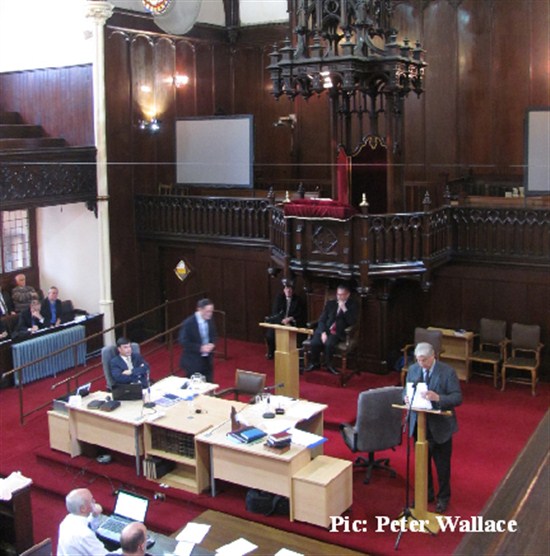 Following two years of discussion, a Plenary Conference in Dingwall in August 2010 and an extraordinary Plenary Assembly (of all ministers and an equal number of elders) in Edinburgh on 18/19 November 2010 to discuss whether hymns and instruments could be used in worship in the Free Church of Scotland. Following two years of discussion, a Plenary Conference in Dingwall in August 2010 and an extraordinary Plenary Assembly (of all ministers and an equal number of elders) in Edinburgh on 18/19 November 2010 to discuss whether hymns and instruments could be used in worship in the Free Church of Scotland.
The ‘Deliverance’ to the Plenary Assembly (the last one was held in 1843 at the time of the break from the Church of Scotland) recommended that the Church maintain the status quo albeit allowing freedom to use hymns and instruments at meetings ‘other than public worship’.(In fact at least one church had been doing just that for some time.)
In the event those gathered voted by a narrow margin (of 98/84 and hinging on 7 voters ) to give freedom to local Free Church congregations to use hymns, other Christian songs and instruments in worship. Transcripts and a report by an observer have been published on the internet.
The following represents ‘sound bites’ taken as a 'distillation' from these sources. Within a single set of “quotes” are sometimes contained remarks and responses to them. The questions, remarks and responses are grouped under themes/topics. Whilst the headings are somewhat arbitrary they have been chosen as a rough guide to the issues and the sentiments expressed relating to them.
There has been no attempt to put the quotes in any fixed or chronological order: some may appear under more than one heading: some relate to more than one topic.
-------------
Headings
Key quote:
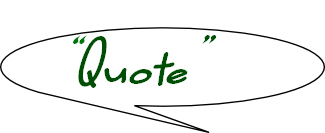 The chairman of the Board of Trustees – who opposed the Board’s Deliverance [to maintain the status quo] – insisted that the Amendment [to allow hymns and instruments] was the unity option. The chairman of the Board of Trustees – who opposed the Board’s Deliverance [to maintain the status quo] – insisted that the Amendment [to allow hymns and instruments] was the unity option.
While he commended the Board for articulating the church’s historic position so clearly, he pointed out that the Free Church’s position was incoherent and perhaps even dishonest, because it permitted churches to have “fellowship meetings” that were identical to worship services.
Either the church needed to crack down on the progressives, or else grant the liberty provided by the Amendment. The Deliverance [advocating ‘no change] would only perpetuate a disingenuous ambiguity.”
-------------
Worship
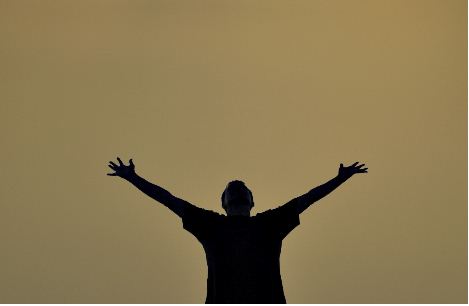
“...wanted public services of worship to be defined as ‘the services ordinarily held on the Lord’s Day and communion services”.
“Give us a scriptural reason for the definition of public worship? The origin of the phrase goes back to 1781. I can’t point to a text. It’s a phrase that has emerged in Scotland.?- A relatively recent distinction.”
“Does the living God looks to see where it is public and not public? Did God just start to do that in 1781? We talk about worship, we have certain rules about worship…..”
“We have moved from OT worship to NT worship. Are musical instruments an inherent part of ceremonial worship? Are they meant to continue? Are they typical? Figurative? We don’t do sacrifices any more –there is an accumulative argument.”
“Where one or any combination of prayer, the reading of Scripture, sound preaching, singing of psalms etc was present (this basically means that any act of worship in any context should be considered public).”
“does this mean that if we have a Sunday School outing that it is an act of public worship?
Yes – if we call people to pray that is worship.”
“Can I sing hymns in my own home? It is permissible to sing hymns in one’s home. If we are then going to worship we should then separate the two.”
“What do we mean when we are talking about public worship?”
“Preserve services on Lord’s Day and Communions – but you can conduct services on other days in different ways.”
“Never thought he would see the day that we would be gathered at a plenary assembly discussing the nature and form of our worship .”
“Does God have one kind of worship on one occasion and another on another? We are bringing in something that is unscriptural. God is not a legalist.”
“He was concerned about the artificial distinction between public and private worship.”
“Especially the nonsense around public worship.”
“He was wary of the open definition of worship.”
“The report itself is meaningless in its definition of public worship.”
“Very pro psalms etc.”
“The Deliverance would permit churches to do whatever they pleased so long as the meeting was not defined as “public worship. Under the Deliverance, a church could sing ‘I did it my way’ at a funeral, since it is not considered public worship!”
““In a meeting in one’s home, it is certainly permissible to sing hymns. But we need to make clear that it is not an act of worship.”
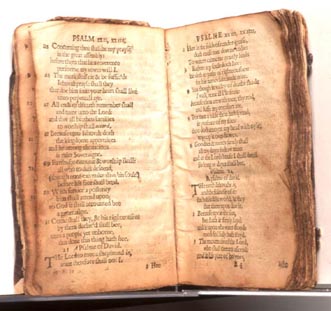 Psalms/Hymns Psalms/Hymns
Psalm book“...wanted the Assembly to draw up a list of portions of scripture suitable for singing, in addition to the psalms”.
“what evidence do you have that the commands to use musical instruments in the psalms have been abolished?”
“The NT church had no uninspired items of praise in the first two centuries.”
“...other parts of Scripture should be versified for praise....gave several examples......wanted faithful renditions of the Scriptures. Should be given to Psalmody committee to enact.”
“Where does a paraphrase end and a hymn start?”
“....said that this would be sung scripture rather than paraphrases”.
“Where in the Bible are we commanded to sing the name of Jesus? The new song worthy is the Lamb. Surely if we are going to sing biblical truth then the name of Jesus, which is so precious to us, should be sung.”
“...said that we must be able to sing about Jesus in other ways.”
“What hymns are we going to have? We could not sing onward Christian Soldiers ‘we are not divided’.”
“The crucial point is what the NT church teaches us.”
“NT church did sing hymns.”
“NT is silent on a lot. Not used after NT was due to cultural reasons. The mandate was not withdrawn”.
“Why allow Scripture song to be sung, rather than scriptural doctrine?”
“Why are we arguing against hymns? Does this border on the ridiculous?”
“Scripture alone is the basis for singing. 22 verses in 17 psalms mention musical instruments – only a small proportion.”
“Jesus used psalms during his ministry. Do we not think that the psalms are about Christ? The songs are guaranteed. Those who have poetic gifts should use their gifts.”
“[The hymns] taught [the speaker] about Christ. He had to lay that aside for many years.”
“Hymns is the thin end of the wedge.”
“There was only one command re singing and it refers to psalms, psalms and psalms.”
“Are you going to stand in the way of congregations who for the good of the Gospel want to sing NT song?”
“He thought that we have no liberty to read anything other than the Word of God. Why does praise not lie on the same basis as the reading of the Word?”
“He did have a difficulty with paraphrases.”
“Over the last 50 years a number of ministers and elders became convinced that there was no biblical basis for the ‘present practice’ of the Free Church.”
“...failure to distinguish between Psalms and responses led to some confusion over the patristic use ofuninspired praise. Many in the early church opposed the introduction of uninspired hymns in place of the Psalms, but regularly utilized uninspired responses”
“If we can have ‘fellowship meetings’ where we sing anything – then we are in trouble.”
[Ed note: This has already been happening.]
Instruments
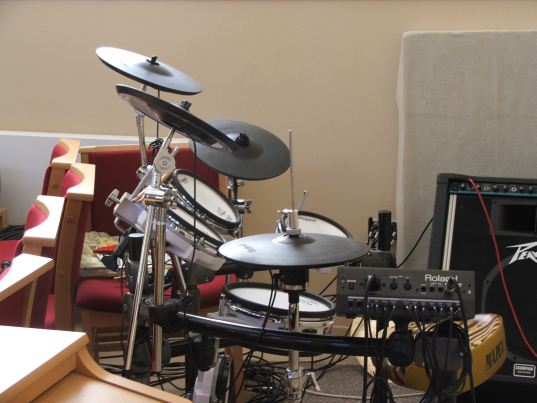
“Does he envision that psalms would be accompanied by instrumental music or precentors?”
“If the command to use instruments is not rescinded - how do you account for NT practice? We are not sure what NT practice was. Plus early church fathers had a view of culture which neither Calvin nor ourselves would accept. Just because the NT church did something does not make it right.”
“Musical instruments – psalms were written to be sung with musical instruments.”
“He had heard a Free Church worship service using a praise band: he has a recording of it. It horrified him.”
“The question then becomes why do this for hymns and not for instrumental music?”
“The OT mandate has not been rescinded for instrumental music.”
“There is a degree of ambiguity in the NT so that should give us freedom.”
“No Church court has a God given right to forbid instrumental music.”
“Did the churches use musical accompaniment in Antioch etc? We don’t know.”
“Who says that instruments are just ceremonial?”
“The sound of the instruments symbolise joy, energy, excitement.”
“There were no detailed rules in the NT, just principles. So why are church buildings circumstantial, and musical instruments elements?”
“Cited Augustine – ‘cymbals touch each others in order to play and therefore some people compare them to lips’”.
“Bad stewardship of money to spend so much on instruments.”
“..instruments were symbolic and passed away with the temple and its sacrifices”
Church
 “I believe that the Free Church stands at a crossroads. Will we continue with a restriction that is contrary to the Word of God.” “I believe that the Free Church stands at a crossroads. Will we continue with a restriction that is contrary to the Word of God.”
“How should churches proceed when there are differences on these matters?”
“This kind of open debate is no longer permissible.”
“How accurate is it to describe the 1900-1904 church as hymn singing?”
“Are we now becoming congregational churches when we leave it up to Kirk Sessions? No. It’s part of our Presbyterianism that Kirk Sessions already administer communion etc.”
“Does not unity in diversity equates to a disjointed and disfunctional denomination.”
“Many people are put off by our worship? Many of us have experienced this.”
“We may lose ministers, become congregational.”
“Will we become a broad church?”
“Every denomination becomes liberal if they go this route. The genie is out of the bottle but we need to put it back in.”
“He did not believe that many Sessions discussed things biblically. We should not have a vote by Session. We are Presbyterians”
“Our church would be decimated if those who did not agree with our position left. Who is the Free Church? Our people? Or our distinctives? A secondary issue is keeping our church in a weaker situation.”
“Without this there will be no church, and where there is no church, there will be no worship. Why should we cut of our nose to spite our face?”
“I have come to the view that this is about uniformity, not psalms/hymns etc.”
“Should we all be doing the same thing? What am I going to say to our young people? We are educating them in the Reformed faith and many of them are leaving us. They have come to different views. And they are going to mixed denominations. I want to keep them in our church.”
“ It would change the character of the Free Church of Scotland forever.”
Such a spirit bodes well for their chances to survive together through the maelstrom that now threatens to engulf them.
“As for legal consequences [regarding the constitutional implications], certainly we should be prepared to face any difficulty.”
“Calvin argued that the Lord’s Supper should be celebrated every Sunday – and I agree with him on this – but we do not have any church in the Free Church that does this.”
“Others pointed out that quite apart from that situation, hundreds, if not thousands, of evangelical Scots have declined to join the Free Church over the years because of their stance on hymnody. Given the decline in membership and attendance in all Christian denominations in Scotland."
"our survival depends in some places upon consolidation. This is not 1900 when everyone went to church.”
“He feared that within ten years the Free Church would be debating women elders, and concluded that “every church that has gone down this road has gone liberal.”
“the influence of the departure of the [Free Church (Continuing)] was notable for two reasons: 1) because some feared that changing the Free Church’s practice of worship could open the church up to lawsuits; and 2) because a significant portion of those who were most strongly opposed to hymns and instruments departed in 2000 – thereby opening the door to the possibility of change.
Law and tradition
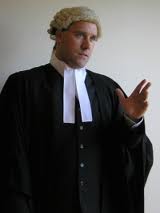 “Did God just start to do that in 1781?” “Did God just start to do that in 1781?”
“1905 Act was sufficient.”
“Confessional – Scottish commissioners made it clear it was OT psalms.
Historical – Chalcedon banned singing of uninspired materials in church.”
“The freedom granted in 2007 should now be withdrawn.”
“Is there any precedent for seeking closure? Yes – the [Free Church Defence Association] in 2000.”
“He was concerned about redundant precentors?”
“How accurate is it to describe the 1900-1904 church as hymn singing?”
“The report does not give any scriptural basis and it looks as though it is just tradition. So we will be mocked”.
“We have not been able to defend this biblically. The Board have not been able to do that. They say there is a difference of opinion so try and tinker about with the legislation”.
“Does God have one kind of worship on one occasion and another on another? We are bringing in something that is unscriptural. God is not a legalist.”
“How can you assert, maintain and defend the practice if you do not think it to be biblical?”
“Does this not make the minister more important? We already have this – the minister already chooses the worship.”
“If the regulative principle requires this, why should we be allowed to not have instrumental music?”
“There are few of us who think that singing hymns and using musical instruments is sinful – hence the proposed repeal of the 1910 Act.”
“NT evidence is ambiguous.”
“No Church court has a God given right to forbid instrumental music.”
“Would they have to be authorized? No just the text of Scripture.”
“The Free Church case was that there was no change in the doctrine, worship etc of the Free Church. Should not continue until we discuss the vows.”
“Our discipline is a mess.”
“You have to rule over your people. You are governors. You have to govern.”
“We were not a democracy.”
“This is 2010 where the church is a thing of the past – not 1910.”
“We have total ambiguity re the vows.”
“The scriptural case is absent from the report.”
“It’s strange to allow Sessions to decide.”
“Had asked the Assembly two years ago for Scriptural evidence for our position. Still waiting.”
“Cited Augustine.....”
“Chalmers was for music in the church. Calvin was not exclusive psalmody.”
“How do you think that we are disjointed and dysfunctional? Because we have not been able to defend this biblically. The Board have not been able to do that.
“The 1872 decision that permitted hymns and the 1883 decision that permitted instruments were very unpopular in the post-1900 Free Church.”
“Those who spoke in favor of the Deliverance made occasional reference to the fact that the Free Church had eliminated hymns and instruments in 1905 – and what new argument now required reconsideration of that decision?”
““If so much of the church [over 75%] is happy with the status quo, why change?”
“How could I vote to change a practice that I have vowed to uphold, maintain, and defend?!” Observer comment: “I had hoped that someone would clearly answer him – but sadly, no one did.”
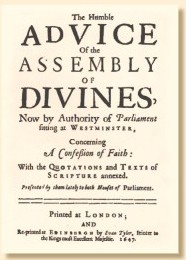 Westminster Confession of Faith Westminster Confession of Faith
“...wanted a reminder of the Confessions teaching of what worship actually is”.
“any act of worship at any time anywhere, must always be offered in the light of the Confession.”
“...then you have no right to limit my conscience…it goes against the Confession’s teaching on liberty of conscience.”
“...at all meetings, worship must always be conducted according to the WCF.”
“any act of worship must always be offered in the light of the definition of worship stated in the Westminster Confession of Faith, chapter 21”
Unity
 “....wants [the whole issue] to be declared ‘divisive and disruptive ‘ to ‘promote views which are contrary to the 1905 act”. “....wants [the whole issue] to be declared ‘divisive and disruptive ‘ to ‘promote views which are contrary to the 1905 act”.
“What impact will this have on wider evangelical unity in Scotland?”
“There are not many things we should put above the unity of the Church.”
“The longer the process continues the more the unity is threatened.”
“What happens for those who cannot assert, maintain and defend the current position under ‘this unity option’?”
“Does not unity in diversity equate to a disjointed and dysfunctional denomination?”
“The report leaves us in a confused position that provides no basis for unity.”
“The result of the Boards report will be a greater diversity of practice and further disunity. The deliverance will undermine our worship, discipline and unity.”
“She could go elsewhere.”
“We are disunited on this issue and we need to find a way to go forward together. We are diverse. We are already diverse on issues such as baptism and the KJV.”
“Opening up a controversial issue so soon after 2000 was inappropriate.”
“We are polarized through discernment. Both sides have a position of conscience. Both are equally strong…..we have a formal process which deals with conscience which is called the Barrier Act. If we can’t agree then we part.”
“He is still not sure how he would vote…probably vote for the deliverance. It will keep us together.”
“Thinks there will be sadness on anyway we vote.”
“Unity is a precious and delicate child. This could strike at the root of our churches unity. So many Kirk Sessions are happy with the status quo. Will we risk change? Let unity be the umpire. Unity is paramount.”
“Let’s keep everyone on board.”
“Some argued that the Assembly should try to please the majority. But others argued that liberty was the unity option.”
“The second principle is the unity principle.”
“It is not a unity option because it is weak - we have tried to patch over it.”
“the introduction of hymns and instruments was “the thin end of the wedge,” that would result in greater innovations until “we split apart in a violent explosion.”
“Let unity be the umpire. No. If it is not a unity based on Scripture it is nothing.”
“It will lead to anarchy and atomisation.”
Doubt and inconsistency

“It appears that the Deliverance cannot give good biblical grounds for their position.”
“Why show tolerance on psalms/paraphrases but not on musical instruments?”
“What evidence do you have that the commands to use musical instruments in the psalms have been abolished?”
“[The Chairman of the reporting committee] did not present the report because he did not back it.”
“Why does the report not have the scriptural basis for the position?”
“What are we authorized to use?”
“How should churches proceed when there are differences on these matters?”
“Why should we proceed against the majority of Kirk Sessions preferred positions?”
“We have moved from OT worship to NT worship. Are musical instruments an inherent part of ceremonial worship? Are they meant to continue? Are they typical? Figurative? We don’t do sacrifices any more –there is an accumulative argument.”
“What is commanded to be used but what is not commanded is not to be used.”
“Where does a paraphrase end and a hymn start?”
“We need to connect what we have done in the past and what we hope to do the future.”
“what impact would this have on the freedom of Free Church ministers to participate in the worship of other denominations?”
“Can we personally hold other views? Yes – but not promote them.”
“I can’t say , leave it to the Assembly.”
“Not good enough. We are bound by our vows and this would inevitably lead to discipline. “That would be up to the Assembly.”
“There was considerable questioning about what exactly [he] met.
“Does this mean that if we have a Sunday School outing that it is an act of public worship?
Yes – if we call people to pray that is worship.”
“Can I sing hymns in my own home? It is permissible to sing hymns in one’s home. If we are then going to worship we should then separate the two.”
“What about visiting ministers? What does this mean? In a Free Church if we had a visiting Free Church minister who objected then we should bow to his scruples”.
“Does the Assembly have a more restrictive view than the KS? Yes because there are people with different views. What about on a Kirk Session? Yes you have to work it out. It’s not just simply a majority vote. What about members? Should they not be respected?”
“Who do you understand we are singing to when we are singing the Lord is my Shepherd?
Jesus – but whats wrong with singing Jesus is Lord.”
“How can you assert, maintain and defend the practice if you do not think it to be biblical?”
“Does it not mean that a minister could not be considered by certain congregations?”
“Because we have different views and understanding of the regulative principle. The way forward is to recognize that there is diversity of opinion on this.”
“If it sinful we should not do it anywhere. How can worship be acceptable to God in another church but not in the Free Church? The Board says we must both permit and forbid the practice. I can speak out a hymn in church, but singing it is unacceptable.”
“...asked about his daughter who felt she could not attend Leith because she is a music teacher who writes praise songs.”
“..the question then becomes why do this for hymns and not for instrumental music?”
“Should a local church be bound by another local church 200 miles away?”
“Why allow Scripture song to be sung, rather than scriptural doctrine?”
“Scripture is not clear and so we should allow variety. The genie is out the bottle – we have been given liberty and now we are being asked to assert, maintain and defend what we do not believe.”
“Does God have one kind of worship on one occasion and another on another?”
“Was 99% of Christendom wrong including the people who write our sermons – Spurgeon, Lloyd Jones, etc?”
“How can some men stay in the Free Church if we ask men to assert, maintain and defend a position they no longer hold?”
“What is he going to do with his brethren who have argued so biblically and well who believe they can use hymns and musical instruments? I cannot just dis-fellowship them.”
“This was a problem coming home to roost. We have allowed differences of worship overseas.”
“Over the years the Free Church had clearly decided that ministers and elders were free to sing uninspired materials when visiting other churches.”
“How did the Board [which presented the Deliverance know that Kirk Sessions were 70% in favour of [the status quo] being the biblical position?”
“No one has tried to deal with the fact that we have two different positions shown from scripture!”
“If we believe that worship with hymns and instruments is acceptable to God in other churches, then how can we say that it is unacceptable to God in the Free Church? Either we need to say that it is sinful in all circumstances, or else permit it in the Free Church…”
“The [youth of the Church] will hear that the General Assembly is trying to “accommodate two views of worship. We should not be happy with two! Is God unclear?!
A closing thought
from observer Dr. Peter J Wallace of Indiana:
One final thing that became clear in the debate was that the Free Church does not have a clear definition of public worship. The debate has focused so much on the question of inspired vs. uninspired praise that they have not worked through the question “what is public worship?”
This observer, for one, wished that someone had spoken of worship as a meeting of the Triune God with his covenant people.
If the debates about congregational praise result in the Free Church of Scotland thinking more deeply and biblically about worship, then this whole exercise will not be in vain. As the Free Church sets itself to the task of bringing the gospel to Scotland, I hope that they will not become so preoccupied with mission that they forget worship. The whole point of the Free Church’s mission to Scotland is so that Scots (of all ethnicities!) might worship the Triune God!
|